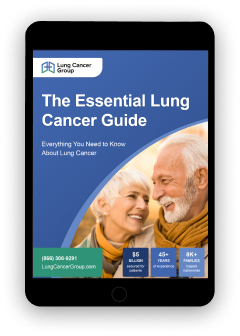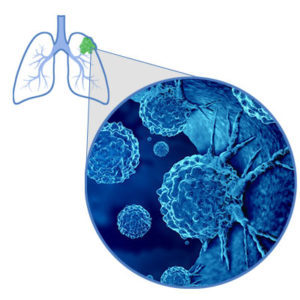Stage 1 Lung Cancer
If you have stage 1 lung cancer, your tumor hasn’t spread far. With treatment, you could potentially live for many years. We can help you or a loved one with stage 1 lung cancer better understand this diagnosis, explore treatment options, and pursue financial compensation for expenses.
What Is Stage 1 Lung Cancer?
 Stage 1 lung cancer is one of the earliest stages and is easier to treat. The tumors at this stage are small, typically between 1 and 3 centimeters, and are found only in one lung.
Stage 1 lung cancer is one of the earliest stages and is easier to treat. The tumors at this stage are small, typically between 1 and 3 centimeters, and are found only in one lung.
While most patients aren’t diagnosed in this stage of lung cancer, those who are typically live longer since doctors can offer a wide range of treatments like surgery, chemotherapy, and more.
Lung Cancer Group may be able to help you pursue financial compensation if your lung cancer was caused by asbestos exposure. Learn more with our Free Lung Cancer Guide now.

- Understand risk factors
- Find top treatments
- Pursue compensation



Types of Stage 1 Lung Cancer
There are two types of lung cancer: non-small cell lung cancer (NSCLC) and small cell lung cancer (SCLC). Learn about the types of stage 1 lung cancer below.
Non-Small Cell Lung Cancer Stage 1


Non-small cell lung cancer uses the tumor, node, metastasis (TNM) staging system like other cancers and has 5 total stages (stages 0-4).
In stage 1 non-small cell lung cancer, the tumor is contained to just the lung, making it easy to treat. There are two substages: Stage 1A and 1B.
Stage 1A
Stage 1A NSCLC lung tumors are 3 centimeters or smaller.
Additional classifications based on tumor size include:
- 1A1: The tumor is 1 centimeter (about the size of a pea) or smaller or less than 3 centimeters (size of a grape). It has spread no more than 0.5 centimeters into lung tissue.
- 1A2: The tumor is between 1 and 2 centimeters.
- 1A3: The tumor is between 2 and 3 centimeters.
Doctors can effectively treat stage 1A lung cancer tumors to improve patient life expectancy.
Stage 1B
Stage 1B NSCLC tumors are over 3 centimeters but under 4 centimeters in size. Tumors haven’t spread to the lymph nodes but may have reached the main bronchus (tube that carries air into the lungs) and/or the pleura (lung lining).
In some cases, a patient may experience partial or complete lung collapse, according to the National Cancer Institute. That said, patients often live a long time in this stage with treatment.
Small Cell Lung Cancer Stage 1
Doctors don’t use the TNM system for small cell lung cancer. What would be stage 1 small cell lung cancer is called the limited stage, and it is localized to one side of the chest. One in three SCLC patients is diagnosed in this stage.
Call (877) 446-5767 if you have lung cancer. We can help you pursue compensation for treatments, if eligible.
Symptoms of Stage 1 Lung Cancer
Some patients may not experience any lung cancer symptoms at stage 1. This means patients might not see a doctor until symptoms worsen, meaning the cancer will likely be in a higher stage.
Stage 1 lung cancer symptoms include:
- Bloody mucus
- Chronic cough that gets worse
- Frequent lung infections
- Shortness of breath
Lung cancer symptoms in stage 1 could be mistaken for less serious health issues, like the flu.
“I got more and more bouts of bronchitis or pneumonia, and I would spike these random fevers out of nowhere. And I just had this chronic wheeze that would never go away.”
– Lauren, stage 1 lung cancer patient
Diagnosing Stage 1 Lung Cancer
If you are experiencing any of lung cancer stage 1 symptoms, talk with your doctor as soon as possible. They will want to begin tests to provide a stage 1 lung cancer diagnosis.
These tests may include:
- A basic health exam to assess any risk factors (such as history of smoking and asbestos exposure)
- Imaging tests like X-rays, CT scans, and MRIs to look inside your body for possible tumors
- A biopsy of a tissue or fluid sample to determine if you have lung cancer
Roughly 26% of patients are diagnosed with early-stage lung cancer, according to the American Lung Association. However, it is becoming more common for patients to be diagnosed early with advances in screening and diagnostic tests.
Get our Free Lung Cancer Guide now to explore treatment options that can help you live longer after a stage 1 lung cancer diagnosis.



- Understand risk factors
- Find top treatments
- Pursue compensation



Prognosis for Stage 1 Lung Cancer
Stage 1 lung cancer has a better prognosis, or overall health outlook, compared to other stages. With treatment, patients can live for many years, and some are considered cured.
“There are very encouraging results with some stage 1 lung cancer patients who get treated.”
– Dr. Elisabeth Dexter, lung cancer specialist at Roswell Park Comprehensive Cancer Center
Factors affecting your prognosis include:
- Age: Younger patients can often undergo more aggressive treatments.
- Health: Nonsmokers without other health problems often have a better outlook.
- The treatment plan: Multimodal treatment plans that combine several therapies often help patients live longer.
- The type of lung cancer: NSCLC generally has a better prognosis than SCLC since it spreads at a slower rate and is easier to treat.
Doctors measure stage 1 lung cancer prognosis through life expectancy and survival rate figures. Learn about each below.
Stage 1 Lung Cancer Survival Rate
Stage 1 lung cancer patients have better survival rates than those with advanced lung cancer. The 5-year survival rate for stage 1 lung cancer ranges from 70-90%, according to Roswell Park Comprehensive Cancer Center.
Stage 1 Lung Cancer Life Expectancy
Stage 1 lung cancer patients who received surgery had a life expectancy of 68 months, according to a study in The Journal of Thoracic Oncology.
Some patients have lived for 20 years or more after their diagnosis since doctors were able to remove or destroy all of their cancer.
“I’m a kinder person and am more patient with my wife, my kids, and everybody. I don’t let the little things interfere.”
– David, 25+ year stage 1 lung cancer survivor
Contact us now for help affording treatments that can improve your stage 1 lung cancer prognosis.
Treatment for Lung Cancer Stage 1
Stage 1 lung cancer treatments can help patients become long-term survivors. Which treatments doctors use will depend on their type of lung cancer, overall health, and other factors.
Learn about the best treatments for stage 1 lung cancer below.
Lung Cancer Surgery
With lung cancer surgery, doctors remove tumors along with surrounding lung tissue and lymph nodes.
The following surgeries may be used to treat stage 1 lung cancer:
- Lobectomy opens the thoracic (chest) cavity and takes out the lobe of the lung that has the tumor. Most surgeons believe that lobectomy offers the best chance for a cure since it removes more tissue.
- Segmentectomy removes a section of a lung lobe. It can be used to remove a very small stage 1 NSCLC tumor. Doctors may recommend segmentectomy if removing the entire lung lobe is dangerous.
- Wedge resection removes a tumor and a small amount of healthy tissue around it. Your care team may recommend this surgery if removing the entire affected lung lobe is dangerous.
“If you have stage 1 NSCLC, surgery may be the only treatment you need.”
— American Cancer Society
After surgery, doctors will check the removed tissue to see if there are any cancer cells at the edges. If there are, they may recommend additional treatment options.
Chemotherapy for Lung Cancer Stage 1
Chemotherapy for lung cancer uses powerful drugs to shrink tumors and kill cells. Cancer care teams usually provide adjuvant chemotherapy (which means it is offered after surgery). It may also be used if the cancer has a high chance of returning (recurrence).
Radiation for Lung Cancer Stage 1
Radiation therapy uses high-energy beams to treat lung cancer. Oncologists (cancer doctors) may use radiation after surgery to kill leftover cells. It may also be used as an alternative to surgery.
Immunotherapy
Immunotherapy uses immune-boosting drugs to help the body target and attack cancer cells. While typically used for advanced or metastatic lung cancer, it may be used in stage 1 cases to help keep the cancer from spreading.
Get Help After a Lung Cancer Stage 1 Diagnosis
Knowing you have stage 1 lung cancer can be scary, but you can find hope in knowing that treatments are available to help you live longer.
By working with experienced lung cancer doctors, you can get access to the best treatments and work toward long-term survivorship. Many other stage 1 lung cancer patients have lived for years, if not decades, following a diagnosis.
If you or a loved one’s stage 1 lung cancer was caused by asbestos exposure, Lung Cancer Group may be able to help you access financial compensation for treatment and other expenses.
Call (877) 446-5767 or get our Free Lung Cancer Guide now to see how we can assist you.
Stage 1 Lung Cancer FAQs
What is the stage 1 lung cancer recurrence rate?
Recurrence is when cancer comes back after a period of remission. Between 5% and 19% of stage 1 NSCLC patients experience lung cancer recurrence, according to the Willamette Valley Cancer Institute and Research Center.
Regular follow-up screenings with your doctor can help detect recurrence early so you can get additional treatment.
What is the stage 1 lung cancer life expectancy without treatment?
The stage 1 lung cancer life expectancy without treatment is 12 months. For this reason, patients are strongly encouraged to get treatment.
Stage 1 lung cancer is the easiest stage to treat, meaning patients can potentially live for decades with proper care. Contact our team for help exploring and affording treatments.
Is stage 1 lung cancer curable?
While there’s no universal cure at this time, lung cancer may be curable in some patients if doctors diagnose and treat it in the early stages.
Stage 1 lung cancer has a much higher survival rate than more advanced stages of lung cancer.
What does stage 1 lung cancer feel like?
Stage 1 lung cancer may not feel like anything, as some patients don’t have symptoms. Other patients may experience mild symptoms of stage 1 lung cancer, like a cough and shortness of breath.
Don’t ignore any potential symptoms of stage 1 lung cancer. Getting an early diagnosis and prompt treatment could allow you to live much longer.
How long do you live with stage 1 lung cancer?
You could live a full life following a stage 1 lung cancer diagnosis, provided that you get aggressive treatment.
For example, Dave was diagnosed with stage 1 lung cancer in 1998 and underwent a lobectomy. He was declared cancer-free. Now, over 25 years later, he uses his experience to help and advocate for other patients.
Get our Free Lung Cancer Guide to learn more about treatments for stage 1 lung cancer that could improve your survival time.
How fast does stage 1 lung cancer spread?
It depends. SCLC at any stage typically grows and spreads faster than NSCLC, according to Moffitt Cancer Center. Other factors, such as where the tumor is located, will affect how quickly stage 1 lung cancer progresses to more advanced stages.
For this reason, it is critical for patients to receive a diagnosis and treatment as early as possible.
What is the best treatment for stage 1 lung cancer?
The best treatment for stage 1 lung cancer will vary for each patient. Doctors often use a combination of surgery, chemotherapy, radiation, or immunotherapy for optimal results.
Talk to your health care provider to learn which stage 1 lung cancer treatments will be most effective in your case.

